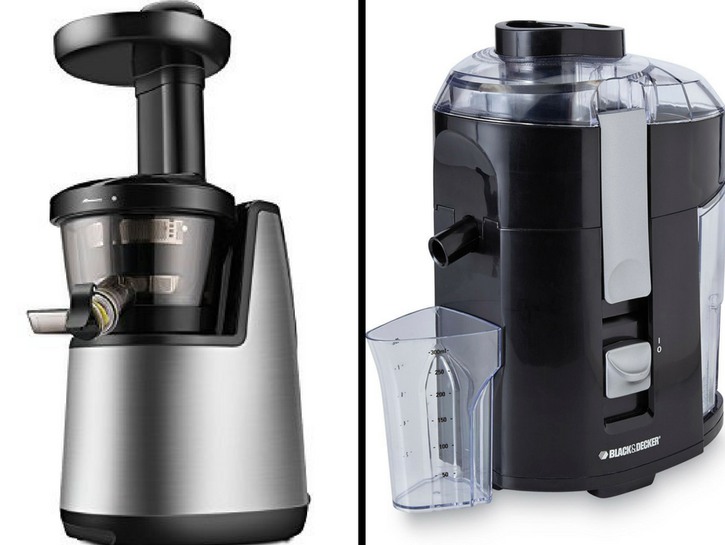Juicing has become popular in recent years, and for good reason. Juicing yields many health benefits including weight loss and improved cardiovascular health. If you’re interested in making your own juice at home, you’re probably overwhelmed by the amount of information there is and confused on which juicer you should purchase. Here we break down the difference between the two types of juicers: centrifugal and cold press.
Centrifugal

Black and Decker Fruit and Vegetable Juice Extractor – $39.99 / Amazon.com
Pros:
- Affordable: Prices range from $23.99 to $65
- Produces less pulp
- Larger feeder, meaning less prep
Cons:
- The shelf life of juice is significantly short due to high oxidation
- As noisy as a blender
- Doesn’t juice leafy vegetable well
- Produces less nutritious juice
- Cannot make nut milk
This is the most common of juicers. They tend to be much cheaper than cold press juicers and are available at almost all retail stores. The main difference between this juicer and its counterpart is the method in which it extracts juice. It uses a sharp blade to pulverize the fruit or vegetable, extracting the juice from its pulp. However, a major downside to this process is that the metal blade generates heat which destroys some of the enzymes of the fruit or vegetable. As a result, juice from a centrifugal juicer is less nutritious than cold press juice.
Another major difference from cold press juicers its ease of use. For most centrifugal juicers, you don’t have to do much prepping of the fruits or vegetables, compared to cold press juicers. However, centrifugal juicers process leafy greens less efficiently. While it is possible to use a centrifugal juicer for kale or spinach juice, less juice is produced. Also, centrifugal juicers tend to be much louder than cold press juicers.
If you’re new to juicing and don’t mind the noise, then centrifugal juicers are perfect juicers for beginners. If you’re ready to purchase one, we’ve put together a list of the best centrifugal juicers.
Cold Press

Pros:
- Quieter
- Produces more nutritious juice
- Efficiently juices green leafy vegetables
- Greater shelf life of juice
Cons:
- More expensive
- Smaller feeder
- Produces more pulp
You’ve probably seen ready-made juice labels say: cold press. What exactly does cold press mean? During this process, fruits and vegetables are pressed with hydraulic pressure, squeezing it and extracting juice with no heat and little exposure to oxygen. As a result of cold pressing, no nutrients and enzymes are destroyed, producing more nutritious juice than centrifugal juicers. Another advantage of cold press juicers is the shelf life of the juice. Specifically, cold press juices have a shelf life of about 5 days while centrifugal juice has to be consumed within 4-6 hours–that’s quite the difference.
Additionally, you’re not limited to making vegetable and fruit juices, cold press juicers can be used to make nut milk. As mentioned earlier, centrifugal juicers are very noisy; however, cold press juicers are very quiet. Though, unlike its counterpart, cold press juicers can be very pricey–the average price for a cold press juicer is around $220.
Juice Ideas
The Energizer

This is a classic coconut and kale green juice combines 4 vitamin-packed ingredients to make a juice that is both refreshing and energizing. All you have to do is juice 4-6 cups of torn kale, two granny smith apples, and ginger root, and just add 4 ounces of coconut water. It is a perfect pick-me-up and pre-workout drink.
The Hydrating Chiller

When you feel dehydrated on a hot summer day, don’t reach for a plain glass of water. Instead, mix of this concoction of cucumber and watermelon juice. Just juice a couple of cubes of watermelon and slices of one whole cucumber. Pour over ice and enjoy your refreshing chiller.
The Immune Booster

This juice is loaded with essential immune boosting vitamins C and B-6. Juice one red apple, one peeled orange, and two carrots. This orange mixture especially beneficial when you’re fighting a cold.
